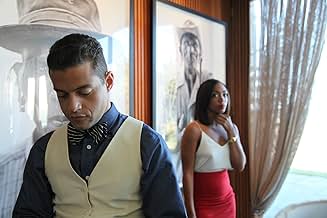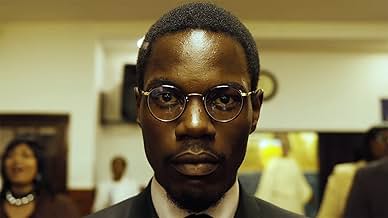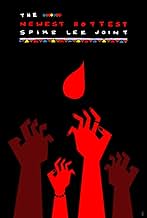An anthropologist awakes with a thirst for blood after an assistant stabs him with a cursed dagger.An anthropologist awakes with a thirst for blood after an assistant stabs him with a cursed dagger.An anthropologist awakes with a thirst for blood after an assistant stabs him with a cursed dagger.
- Director
- Writers
- Stars
Felicia Pearson
- Lucky Mays
- (as Felicia 'Snoop' Pearson)
Stephen McKinley Henderson
- Deacon Yancy
- (as Stephen Henderson)
- Director
- Writers
- All cast & crew
- Production, box office & more at IMDbPro
Featured reviews
Dr. Hess Green becomes cursed by a mysterious ancient African artifact and is overwhelmed with a new-found thirst for blood.
Spike Lee has made a very strange film here. Maybe because it was based on another film that happens to be rather strange ("Ganja and Hess") or maybe because it was filmed with a low budget and short on time, with relatively unknown actors... but there is something decidedly off about the picture.
Like the original, there is an ongoing metaphor about addiction. The main character is not a vampire in the traditional sense, despite an unquenchable thirst for blood. He expresses that many (perhaps most) people have addictions... drugs, money, alcohol, women... his is just different.
The Jesus parallel is played up from the original. There is indeed something strange about a man (Jesus) who asks his followers to eat his flesh and drink his blood. Christians, of course, do not find it strange. And that makes the parallel interesting... why do we recoil at one man's thirst for blood and yet look forward to drinking blood each Sunday without thinking anything of it?
Spike Lee has made a very strange film here. Maybe because it was based on another film that happens to be rather strange ("Ganja and Hess") or maybe because it was filmed with a low budget and short on time, with relatively unknown actors... but there is something decidedly off about the picture.
Like the original, there is an ongoing metaphor about addiction. The main character is not a vampire in the traditional sense, despite an unquenchable thirst for blood. He expresses that many (perhaps most) people have addictions... drugs, money, alcohol, women... his is just different.
The Jesus parallel is played up from the original. There is indeed something strange about a man (Jesus) who asks his followers to eat his flesh and drink his blood. Christians, of course, do not find it strange. And that makes the parallel interesting... why do we recoil at one man's thirst for blood and yet look forward to drinking blood each Sunday without thinking anything of it?
Many people have said that an actor has played a character in at least one bad movie and this proves it. Jesus, I can't believe Rami Malek is in this horrible movie. Oh gosh, I wish I could go back in time and tell him please no. What is he doing here? Plots, Dr. Hess Green becomes cursed by a mysterious ancient African artifact and is overwhelmed with a newfound thirst for blood. Soon after his transformation he enters into a dangerous romance with Ganja Hightower that questions the very nature of love, addiction, sex, and status. For the supernatural side, okay in my opinion. But on the romance side, its very unreal. How come after her husband died then she find her husband's body in the basement and she are still attracted to the protagonist?
Spike Lee is one of the premiere directors of my generation. With that said, I am still trying to figure out the focus and purpose of this movie. The actors, many of whom, we've seen in other Lee films, are so subdued and non significant. The movie seems to lack...well, life. His career has created valuable works that have symbolically and literally offered calls for self-awareness and offered insights into the social-political realities of African-Americans and America in general. I can't figure out what significance this movie has. There are some disturbing scenes that do not seem to add any insights or purpose to the movies story. The few things I gathered from this are: rich/poor exploitation, addiction, socio-sexual dynamic, and Sankofa. The story telling doesn't offer anything new or dynamic. So, with a heavy heart, I give this a thumbs down and not let this be representative of Spikes true genius!
As an old fan of Ganja & Hess, i was very curious to see Spike Lee's take of this arty oddity.
Very few things changed from the script, except the part of minor characters : the slow pace, the theatrical acting and the general mood are scrupulously respected, so you must expect an art-et-essai movie rather than an usual vampire flick.
I didn't found it as bad as the other reviewers, even if I can express a few reserves : the score that sometimes looks like a sort of car play-list (the original was quite experimental), or the lack of twisted shots that made the first movie so unique.
However, I hope that it will encourage the new generation to rediscover the 73 version that still shines like a black diamond, with its strange mix of perversity and religious knick-knack.
Very few things changed from the script, except the part of minor characters : the slow pace, the theatrical acting and the general mood are scrupulously respected, so you must expect an art-et-essai movie rather than an usual vampire flick.
I didn't found it as bad as the other reviewers, even if I can express a few reserves : the score that sometimes looks like a sort of car play-list (the original was quite experimental), or the lack of twisted shots that made the first movie so unique.
However, I hope that it will encourage the new generation to rediscover the 73 version that still shines like a black diamond, with its strange mix of perversity and religious knick-knack.
I have loved most of the Spike Lee joints I have seen, but this time I felt much disappointed with the remake of "Ganja & Hess". To start with I still do not fathom the cult following of the original: it is true that for its time it was an innovative approach to cinema dealing with paranormal activity, and quite different from most African-American motion pictures of the 1970s, but at the same time I found its central premise a bit pompous and wordy, and many viewers' reactions a bit exaggerated. The so admired "slickness" of both versions is too ornate for me, and quite distracting: it makes the plot look sillier than it is for all its pretension that we are witnessing an "awesome" psychological drama. I have to admit though that Bill Gunn had more control over his own material than Lee: the remake is amazingly disjointed and even longer than the original, with extensive stretches of "music videos" that could have been cut without affecting the drama. As a matter of fact Lee's film contains good elements that do no blend, as Bruce Hornsby's score and varied songs so omnipresent and badly dosed that the soundtrack becomes annoying, no matter how good the composition or the tune are. Then take the beautiful opening credits sequence or the great church scene featuring Valerie Simpson singing and playing the piano, mix them with the obligatory lesbian scene, the dispensable garden cocktail for white scholars, the unexplained trips to town (Hess must certainly be a hot specialist on the Ashanti culture, but we see little of that), the trivial little procession after the wedding... and you get something very bloody but hardly sweet. Your "cultural background" will not suffer much if you skip this.
Did you know
- TriviaFilming was completed in 16 days.
- ConnectionsReferenced in Harmontown: Explain Your World View (2017)
- How long is Da Sweet Blood of Jesus?Powered by Alexa
Details
- Release date
- Country of origin
- Official site
- Language
- Also known as
- The Newest Hottest Spike Lee Joint
- Filming locations
- Production company
- See more company credits at IMDbPro
Box office
- Budget
- $1,420,000 (estimated)
Contribute to this page
Suggest an edit or add missing content








































